What is Secondary Insomnia?
Did you know that 80% of insomniacs suffer from secondary insomnia? It’s true. This form of “sleeplessness” stems from something else, such as a medical condition, injury, or medication side-effects.

You spend most of the night staring at the ceiling fan and tossing and turning. You hate nights like these – restless nights where you don’t get a wink of sleep. Why is this happening? Well, the most logical reason is your condition. Let’s say you suffer from restless leg syndrome (RLS), which affects your nerves and causes nighttime leg twitches. Because you have an uncontrollable urge to move your legs, it is hard for you to fall and stay asleep.
Every way you turn, you feel urges to move your legs – urges that keep you up all night and make you feel like roadkill the next morning. At this rate, you’re never going to get enough sleep to feel active and productive. So, what do you? Keep running on fumes or do something about your secondary insomnia? Well, do something about it, of course.
The good news is help is available. Online insomnia treatment programs, like Somnus Therapy, can have you on your way to quality sleep in no time at all! And, guess what? You can combine a sleep program with other natural tools like melatonin supplements, stress-management techniques, and lifestyle changes. So, you don’t have to spend another sleepless night because of your health condition, injury, or medication. You can get the sleep your brain and body need to repair themselves each night – you just need the right tools.
If you are wondering if what you’re experiencing is secondary insomnia, you are in luck, because this article can help you determine if an ailment, injury, medication, or something else is keeping you awake at night.
Content
Are There Different Types of Insomnia?
There are two distinct types of insomnia – primary and secondary. Primary insomnia is not linked to a health condition, injury, or medication side-effects. With primary insomnia, the “cause” is vague or unknown. While with secondary insomnia, there is a known “cause” of the “sleeplessness” (i.e., anxiety, depression, etc., lupus, restless leg syndrome (RLS), etc., or corticosteroids, beta-blockers, etc.).
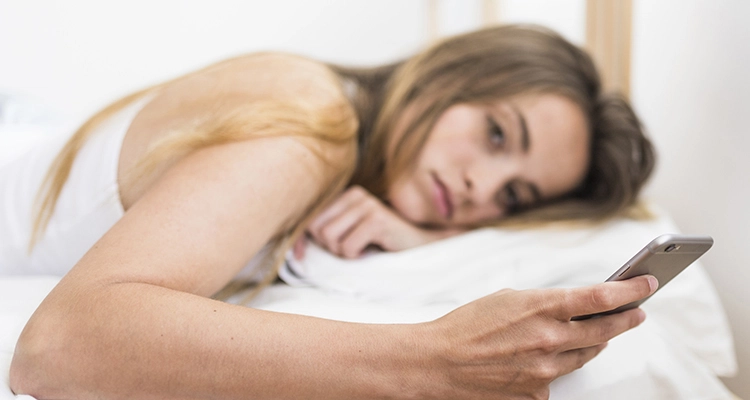
What is Secondary Insomnia?
The most common type of insomnia is secondary insomnia. As mentioned above, secondary insomnia occurs because of something – i.e., a condition or a medication side-effect, or an ailment, tension and stress, anxiety or depression, or a hormonal imbalance.
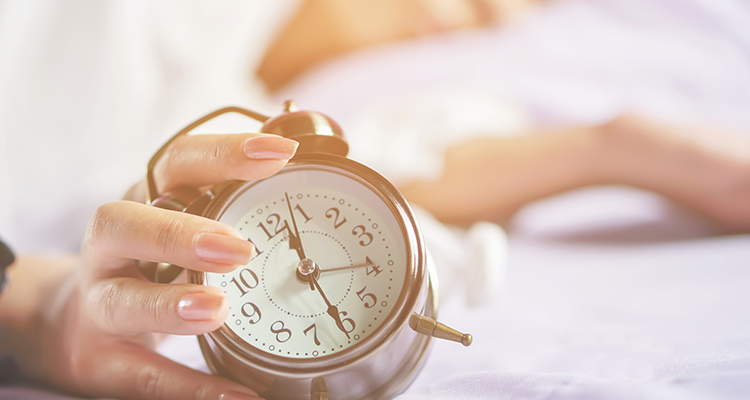
Can Certain Health Conditions Trigger Secondary Insomnia?
Yes, some health conditions can predispose you to secondary insomnia.
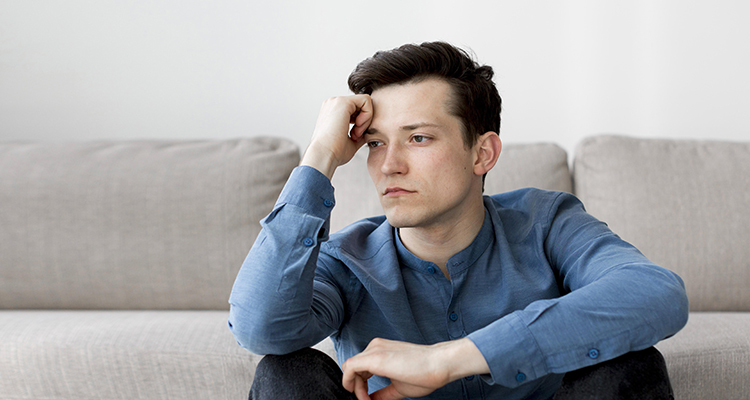
The conditions are listed below:
- Hormone-related conditions (puberty, pregnancy, PMS, menstruation, or menopause)
- Chemical side-effects (drugs and alcohol or processed foods with chemical additives).
- Anxiety
- Circadian rhythm disorders
- Nasal disorders
- Deviated nasal septum
- Post-nasal drip
- Allergic rhinitis
- Dental pain
- Earaches
- Depression
- Chronic pain conditions (fibromyalgia, migraines, arthritis, etc.)
- Gastrointestinal distress (upset stomach, nausea, vomiting, constipation, diarrhea, etc.)
- Sleep-related condition (sleep apnea or restless leg syndrome – RLS)
- Heart attack and stroke
- Medications for colds, asthma, high blood pressure, asthma, depression, etc.
- Stimulants (caffeine, nicotine, and tobacco)
- Hyperthyroidism
- Heartburn, GERDS, and acid reflux
- Hypertension
- Alzheimer’s disease and dementia
- An uncomfortable sleep environment
Note: Any condition that “causes” emotional or physical pain (i.e., RLS, headaches/migraines, sleep apnea, anxiety, asthma, depression) can keep you awake at night.
What’s It Like to Live with Secondary Insomnia?
Ever wonder what it’s like to live with secondary insomnia?
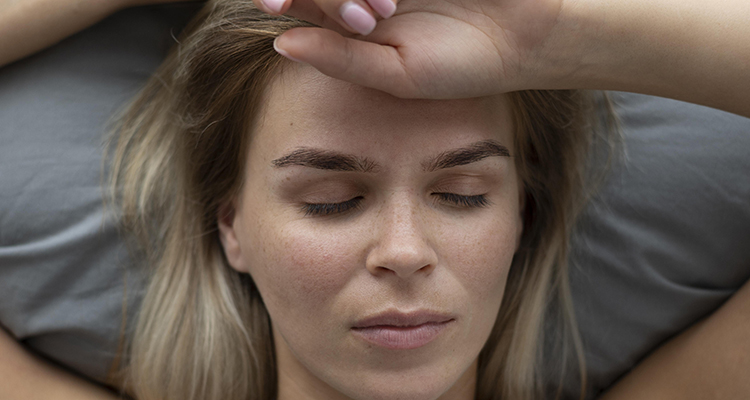
Well, listed below are two secondary insomnia case studies that provide a glimpse into an insomniac’s life.
Encik H.
Encik H. is a 68-year-old man with Parkinson’s disease and secondary insomnia. He has a tough time falling asleep and struggles with frequent nocturnal awakenings. He gets non-refreshing sleep each night. As a result, Encik suffers from daytime fatigue and spontaneous dozing. He goes to bed at 11pm, takes an hour to fall asleep, and is awake by 5am. He is unable to sleep thereafter.
Encik is currently on levodopa and bromocriptine. He spends most of the day at home feeling depressed. He started experiencing dystonia (affecting his trunk and upper limbs) after a change in his medication regimen. According to Encik’s wife, he appears to be confused some nights. During these occasions, he also talks in his sleep. Encik does not appear to struggle with sleep-related breathing difficulties.
Why is Encik experiencing secondary insomnia?
Encik’s Parkinson’s disease is preventing him from getting sound sleep each night. According to a 2011 study, people with Parkinson’s disease have an increased risk of developing depression and insomnia. Moreover, researchers suggest that people with Parkinson’s disease may experience progressive (worsening) secondary insomnia as they age.
In fact, the most common complaint from people with Parkinson’s disease is that it is almost impossible to fall and stay asleep at night. Why does this happen? Well, secondary insomnia commonly associated with Parkinson’s disease stems from a loss or low levels of dopaminergic neurons of the substantia nigra, the part of the brain responsible for circadian rhythms (sleep/wake cycles).
Dopaminergic neurons are located in the middle of the brain and are the primary sources of CNS dopamine. Neurochemical changes involving the serotonergic, cholinergic, and noradrenergic systems, neurotransmitters, can also trigger circadian rhythms (sleep/wake cycles) disturbances or “sleeplessness.” Understand, however, that the exact role these neurotransmitters play in sleep/wake cycles is still vague or unknown.
People with Parkinson’s disease are also at-risk of developing bradykinesia (slow or delayed movement), which can cause them to experience fewer body shifts at night. Bradykinesia can trigger discomfort, pain, nighttime awakenings, and an inability to get up at night and go to the restroom (due to inflexibility). Moreover, tremors, a common symptom of Parkinson’s disease, can cause “sleeplessness.”
Tremors (involuntary movements) during sleep can lead to secondary insomnia. The tremors can awaken you, making it hard to fall back asleep. Additionally, Parkinson’s disease medications (levodopa – a dopamine and noradrenaline precursor) can stimulate the brain and body, leading to frequent nighttime awakenings and poor REM sleep.
Parkinson’s disease is also associated with depression and anxiety, which can make falling and staying asleep all night difficult, if not impossible. Furthermore, people with Parkinson’s disease can experience hallucinations, which prevents them from getting proper sleep. Also, keep in mind that dementia is a late-stage sign of Parkinson’s disease. And, nocturnal confusion and frequent awakenings are common with dementia.
Mrs. Lee
Mrs. Lee is a 62-year-old widow who lives alone. Mrs. Lee is currently on 15mg of diazepam (Valium), a hypnotic, to help her sleep and ease her anxiety. Five years ago, Mrs. Lee’s husband died and a doctor started her on 5mg of diazepam, however, over time, she required a higher dose of diazepam to garner the same results. Her previous attempts to discontinue the medication failed, resulting in secondary insomnia, anxiety, tremor, irritability, nightmares, hyperacusis (a sensitivity to noise), and tinnitus.
Mrs. Lee has altered her daily activities, while on the above medication, but still complains of memory issues. After a recent fall, Mrs. Lee consulted a general practitioner, who advised her to stop the diazepam, due to her perceived memory problems, secondary insomnia, and tendency to fall.
What is causing Mrs. Lee to experience secondary insomnia?
Well, Mrs. Lee’s secondary insomnia most likely stems from the death of her husband. It could also be a diazepam side-effect or a combination of both. Diazepam is not only a hypnotic, but also an anxiolytic, muscle relaxant, and anticonvulsant. It is a long-lasting benzodiazepine that stays in the body for 20-80 hours (half-life elimination).
Benzodiazepines affect the central nervous system and can cause depression. Depression can lead to poor sleep health or “sleeplessness.” Other side-effects associated with benzodiazepines include disorientation, psychomotor delay (impairment), aggression, excitement, mental confusion, and anterograde amnesia (memory problems). Older adults, who take high doses of diazepam, have the highest risk of falls and fractures, and insomnia.
Because Mrs. Lee has been taking high doses of diazepam for five years, she has become dependent on benzodiazepines. Benzodiazepine dependence is characterized by withdrawal syndrome symptoms, such as secondary insomnia, excitement, anxiety, unrest, muscle tension, crossness, nausea, uneasiness, discomfort, excessive perspiration, nightmares or night terrors, depression, hyperreflexia (deep tendon reflexes), tinnitus (ringing, popping, and/or cracking in one or both ears), delusions, and hallucinations. And, when benzodiazepines are stopped too quickly (withdrawal), it can cause seizures.
Will Treating My Primary Condition(s) Automatically Improve My Secondary Insomnia?
Not necessary…

Treating the primary condition does not guarantee that you will experience better sleep. More specifically, it does not automatically mean you will fall asleep quicker, stay asleep longer, and awaken the next morning at the appropriate time. So, while addressing the primary condition may reduce or eliminate your insomnia, there is a chance it will not – at least not initially. Thus, managing your primary condition may not totally resolve your “sleeplessness.”
Let us say that you suffer from lupus and the aches and pains associated with it have been keeping you up at night. Well, it could be that your lupus is being effectively managed – even though you still experiencing insomnia. What if a medication (i.e., steroids) is improving your primary condition (lupus), but preventing you from getting quality sleep? You have your lupus under control, but the main thing controlling your lupus is still keeping you awake at night!
What does that mean for you? It means you may have to address your primary condition, while also working on your sleep issues. That is where Somnus Therapy comes into play. Somnus Therapy is an affordable and convenient online sleep program designed to help you get the quality zzz your brain and body need to function at optimal levels.
How is Secondary Insomnia Treated?
You can reduce or eliminate secondary insomnia by treating the condition, ailment, medication side-effect, or injury that is causing your “sleeplessness.” It is important to sleep well at night because your brain and body use this time to repair, refresh, and re-energize themselves.
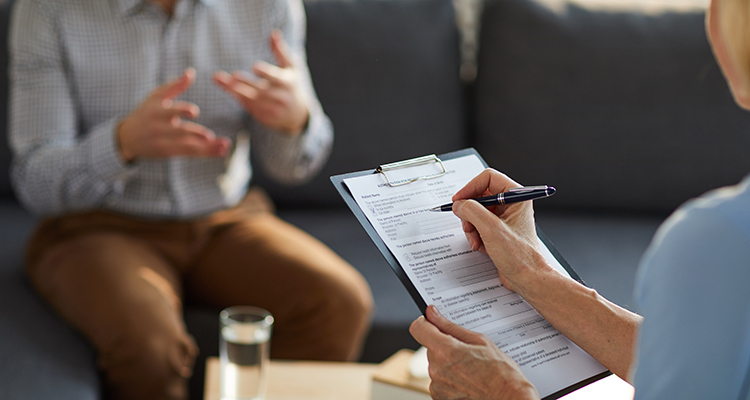
Although the most probable causes of secondary insomnia involve conditions, medication side-effects, or injuries, a sudden or dramatic change in your work shift, medication regimen changes, chronic stress, unemployment, moving, divorce, genetics, seasonal transitions (light/dark extremes), traveling and jet lag, and/or the loss of a friend, loved one, or pet can also trigger it.
The good news is there are affordable, convenient, and effective sleep aids that can ease your discomfort, so you get the sleep you have been missing. These aids may include CBT-I (cognitive-behavioral therapy for insomnia), an online sleep program, lifestyle changes, a consistent bedtime routine, melatonin supplements, “sleepy herbs” like valerian root, chamomile, lavender, lemon balm, and passionflower, and/or sleep medications (like suvorexan), antidepressants, or antihistamines) known to cause sleepiness or drowsiness.
It is important to understand that both prescription and OTC sleep medications carry risks and side-effects. So, it is always best to try the “natural route” first, if possible. However, your sleep remedy will be most effective if it is customized to fit your particular sleep issue and health condition(s).
Are There Any Self-Help Techniques That Can Improve My Secondary Insomnia?
Yes, there are self-help techniques that can help improve your secondary insomnia.
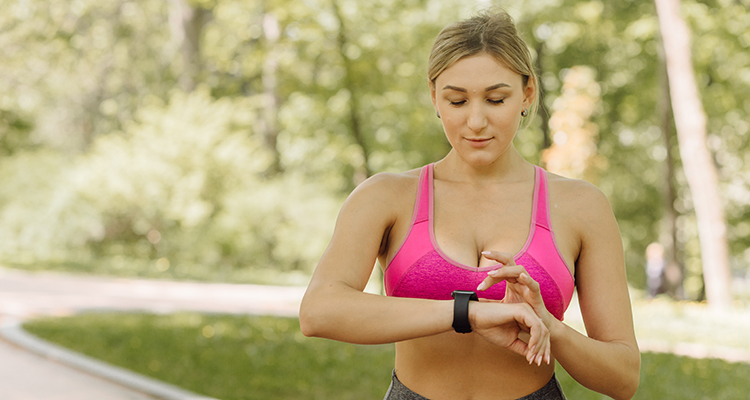
The key to success in getting a good night’s sleep is developing good sleep habits.
Listed below are self-help techniques that can help you get some much-needed zzz:
- Develop a consistent sleep/wake routinePlan to go to sleep and awaken at the same time each night and day. And, if possible, avoid taking midday naps, because it could make it harder for you to fall asleep when bedtime rolls around.
- Shut-down your devicesTurn off your smartphone, tablet, and/or laptop or computer an hour or two before it is time to go to sleep. Researchers suggest that “blue light” from screens not only overstimulates you but can also prevent you from becoming sleepy when it is time to go to bed.
- Avoid caffeine, tobacco, nicotine, and alcohol in the evenings Caffeine, tobacco, and nicotine are considered “stimulants,” which means they can disrupt your sleep/wake cycles. Alcohol should also be avoided in the evenings because it can cause you to awaken multiple times during the night and cause you to have a massive hangover the next morning.
- Move! Daily exercise is always an excellent choice when experiencing “sleep issues.” However, it is important not to exercise too close to bedtime because it could “hype you up” so you do not want to go to sleep when it is time to get some shut-eye. In fact, researchers suggest that there should be at least 3 hours between when you exercise and when you go to bed.
- Eat earlier in the dayThe worst thing you can do for your sleep health is to eat a heavy meal late at night. However, a light bedtime snack (i.e., apples and peanut butter, cheese stick, yogurt, and fruit, etc.) may help you get some sleep. It is hard to sleep when you are hungry, so it is important to make sure you are full (not too full) before bed.
- Get comfortableOne way to improve your sleep quality is to make sure that both you and your bedroom are comfortable. So, change into some comfy pajamas, lower or turn off the lights, shutdown your devices (including the television), turn on a sound machine (to block out external noises like honking horns or barking dogs), and turn the thermostat to between 60- and 68-degrees Fahrenheit. Researchers suggest that the ideal sleeping temperature is not too cold or too hot. However, a little coolness can help you sleep better at night.If a sound machine fails to block out noises, you can always pick up some earplugs. And, if the light shining through your windows prevents you from getting sound sleep, you may want to pick up a sleep mask (to block out light). Lastly, if your bedroom is on the “stuffier” warmer side, you may want to invest in a stationary fan (to cool your room down).
- Have a purpose for your bedIn other words, designate your bed as a place to be intimate (have sex) and sleep. That is it. What does that mean? It means no Netflix movie nights in bed, no scrolling through social media sites or on the internet in bed, no texting while lying in bed, etc. If reading in bed keeps you up all night – then stop that behavior as well! To make this tip work, you will need to re-train your brain to see bedtime and sleep as positive experiences – that are reserved only for sex and zzz!
- Get upIf you have a challenging time staying asleep throughout the night, get up. More specifically, get up a read a book, listen to soft music, or if you must – watch a little non-stimulating television. The key to making this tip work is determining what is non-stimulating for you. So, think of some things that “bore you” or “tire you out” and plan to do those things when you can’t sleep.Note: When I can’t sleep, I turn on “House Hunters” or “Chopped” because they are non-stimulating to me. And, it only takes about 10-minutes for me to be out like a light.
- Be ProactiveWhen you are unable to get quality sleep, be proactive. In other words, don’t let worry keep you awake. If you tend to fret over the tasks you need to complete the next day, make a to-do list (complete with how you plan to accomplish these tasks) a few hours before bedtime. This may help you feel more in control of your life. And, if you feel more in control of your life, there is a good chance your anxiety and fear will also subside, allowing for you to get a good night’s sleep.
- Try Natural Sleep AidsNatural sleep aids like melatonin supplements, online sleep programs, meditation, and lifestyle changes can improve your sleep quality. Online sleep programs, like Somnus Therapy, can help you get the sleep your brain and body crave. Somnus Therapy eliminates those sleepless, restless nights, so your body can concentrate on healing your “primary condition.”Rest is one of the best things you can do for your brain and body. Your body can’t heal itself if you aren’t sleeping. And, if you aren’t sleeping, your symptoms will escalate, making it even harder for you to get the rest you need to be your “best self” the next day.
What Could Happen If I Don’t Address My Secondary Insomnia?
Your brain and body can’t repair or “heal” themselves without proper sleep. And, sleep is especially important if you are grappling with a medical condition, medication side-effects, a hormonal imbalance, etc. Add in insomnia and you have a recipe for disaster. So, the best thing you can do for your mental and physical health is seeking treatment for both conditions.
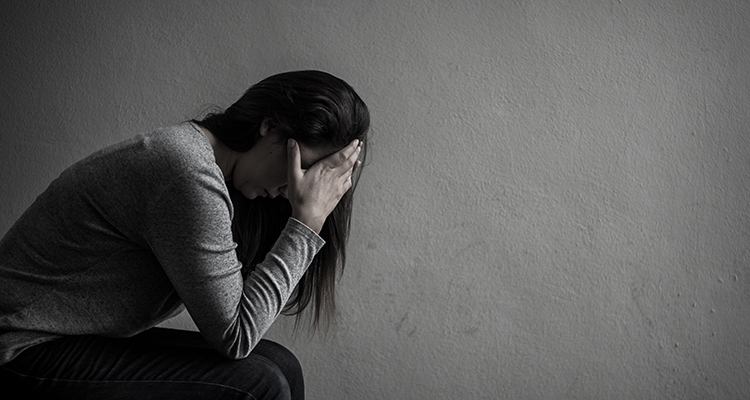
Listed below are the things that “could” happen if you don’t address your secondary insomnia:
- High blood pressure
- Obesity
- Anxiety
- Depression
- Falls and fractures (especially if you are an older adult)
- Frustration
- Inattention or a lack of focus and concentration
- Disorientation
- Memory issues
- Hallucinations or delusions
- Heart attack or stroke
- Crankiness
- Slow reaction time
















